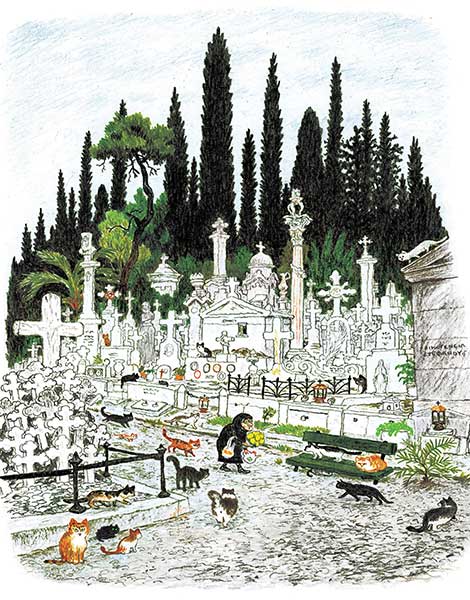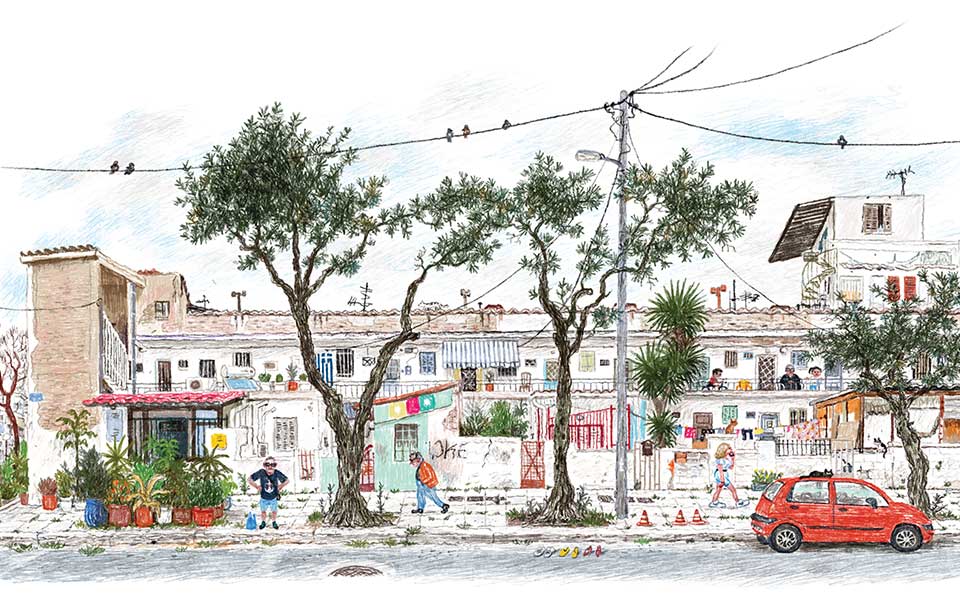14 Stunning Rooftops in Athens for Food, Views...
From Michelin-starred tasting menus to sushi...

A few years ago, he started documenting the Prosfygika. In the photo, the complex on Alexandras.
Low houses with tiled roofs next to apartment complexes, clotheslines and crescent moons, stray cats and street art, car repair shops and quiet street eateries, fishmongers and bulldozers digging into Athens’ depths: all of these scenes are captured in stunning detail by Nicolas Hubesch’s colored pencils and iPad. The French illustrator moved to Pagrati eight years ago for love. “The romance ended, but I stayed,” he says.
Our conversation is prompted by his solo sketch exhibition “Souvenirs d’Athènes,” which opened a few days ago at Prelab in Exarchia. Does he still feel like a stranger? “I’m trying to,” he says. “I make a point of behaving like a tourist in my own city. When you move like a visitor, you’re in the mood to observe and discover. I lived in Paris and didn’t realize how beautiful it was. I walked with my head down, never taking the time to appreciate it.”

The Gouva area of Pagrati and in the distance, the sea of Piraeus.

Corners of the First Cemetery of Athens are captured in many of his sketches.
Nicolas studied decorative arts in Strasbourg but left just before graduation to relocate to Paris. He worked in a variety of jobs before becoming interested in illustration. Now he works with French publishers to illustrate children’s books and magazines. He spends his free time exploring and sketching Athens. “This is a luxury I allow myself; I don’t make a living from it.” He walks everywhere and sometimes hops on a bus without knowing the route.
“The other day, I found myself in Petroupoli (a neighborhood to the west of Athens). I was lost and had no idea where I was because my phone had died. It was no big deal; I asked passersby and eventually managed to find my way back. But I came to the realization that we no longer allow ourselves to get lost. Our lives are not meant to be aimless; everything happens according to a plan, and our fixation with our phones is a sign that we want control over everything.”
The first thing that catches Nicolas’s eye in the neighborhoods he sketches is the architecture. He is fascinated by the contrasts in scale, with old single-story houses standing beside tall buildings. He sits in a corner, frames his scene, and waits. “The people, not the landscape, are what gives the work meaning for me. It’s similar to what Cartier-Bresson did – you wait for a human figure to invade the frame and bring the image to life.”

I notice that his sketches of Athens have a nostalgic quality, which makes me wonder if he alters the images, omits certain elements, or romanticizes them. “I don’t always draw the truth. I occasionally omit things that bother me, and I’ve even drawn imaginary neighborhoods by combining details from various parts of the city. However, I’m generally driven by memory; I want to capture what is disappearing. When I walk through the Kaisariani neighborhood, I notice that buildings are constantly being demolished. If they’re in such a hurry, then so am I.”
He recalls a traditional café near his home in Pangrati. He passed by it every day but never sat there. “It was mostly frequented by elderly people sitting in groups. I didn’t feel like I belonged there, but one day I went in and began drawing. I finished the sketch when I returned home. When I passed by wo days later, the café had closed. The place was empty, and there was a sign on the door saying that it was for rent.”

A day in Vyronas.

Nicolas Hubesch
It was in the same spirit that Nicolas began documenting the Prosfygika (decaying refugee apartment buildings found in various neighborhoods) a few years ago. He started from Kaisariani and then moved on to Vyronas, Nikaia, Neos Kosmos, and Alexandras Avenue. In 2022, he held an exhibition at the French Institute to mark the 100th anniversary of the Asia Minor Catastrophe. “The Prosfygika on Alexandras Avenue are a significant architectural monument, but they also elicit strong emotions. I saw many people become emotional during the exhibition.”
Many of his sketches also capture parts of the First Cemetery of Athens. “It is a beautiful garden; walking there brings peace and tranquility, and I see that many guided tours are now being offered. Athenians are discovering places they previously overlooked or dismissed.”
What is he ultimately looking for in Athens? “What moves me the most is the provincial element, which I find more in the suburbs than in the center. I’m drawn to the neighborhood atmosphere, this microcosm of forgotten single-family homes that are like time capsules of vintage architecture, and the small shops. Perhaps I should travel outside of Athens more.”
And what does he tell his friends about Greece? “The French are crazy about Greece, you know that. I meet an increasing number of people who are permanently relocating to your country. However, the impression I have now is very different from the one I had when I came eight years ago. For example, I wish there was more concern about the environment. I cried during the fires in Parnitha. I’ve said that if Hymettus burns, I will leave. I’m fortunate to live in the city center, next to a mountain and only a breath away from the sea. Don’t you realize how special this is?”
From Michelin-starred tasting menus to sushi...
Discover how Christos, Athens’ master souvlaki...
This summer, Pelagos at Four Seasons...
Six Athenians tell us about their...